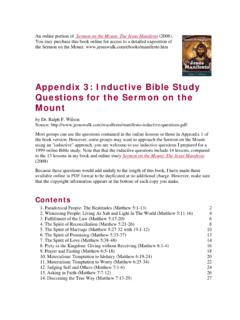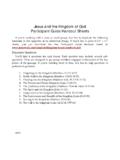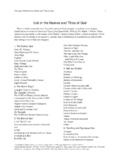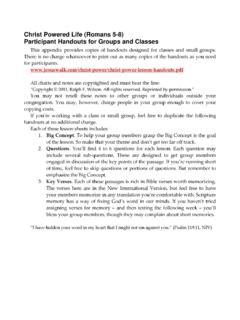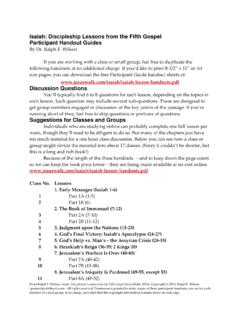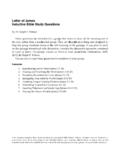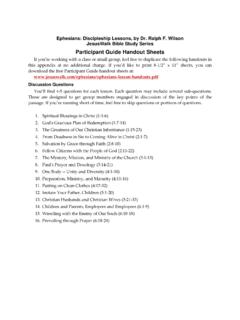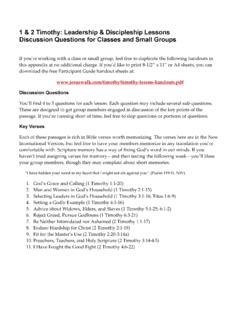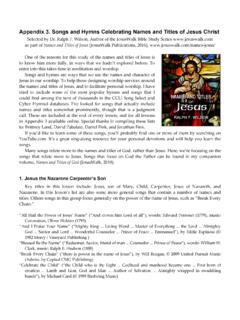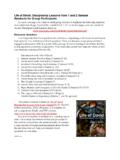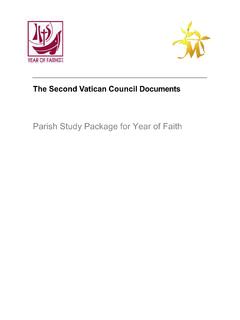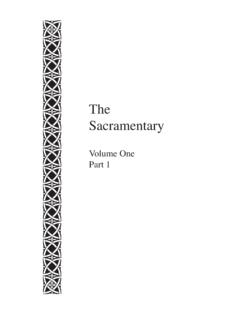Transcription of Experiencing the Psalms: Participant Guide
1 Experiencing the Psalms: Participant Guide If you re working with a class or small group, feel free to duplicate the handouts in this appendix at no additional charge. If you d like to print 8 1/2 x 11 sheets, you can download the free Participant Guide handout sheets at: lesson You ll find 3 to 5 questions for each lesson. Each question may include several sub questions. These are designed to get group members engaged in discussion of the key points of the passage. If you re running short of time, feel free to skip questions or portions of questions. During the first lesson, hand out the Exercises to Help You Experience the Psalms sheet. Then for each successive lesson, ask class members to come prepared to share how they chose to experience one of the psalms included in that lesson based on some of the suggestions given in the exercise sheet. This alone will engage members and make the class great fun and bring great learning. Experiencing the Psalms: Participant Guide 2 From Ralph F.
2 Wilson, Experiencing the Psalms (JesusWalk, 2010). Copyright 2010, Ralph F. Wilson All rights reserved. Permission is granted to make copies of these Participant handouts, one set for each member of a local group, at no charge, provided that this copyright information remains intact on each copy. Exercises to Help You Experience the Psalms In order to encourage you to truly experience the psalms and make them your own, complete one of the following exercises for each of the lessons in this study. These aren t designed to create busywork, but to stretch you spiritually. When you finish, report back to the group how the exercise worked for you. Ideally, you ll vary the exercises from lesson to lesson to allow the Psalms to become part of you in new ways. 1. Pray a Psalm. Select one of the psalms along the theme of the lesson. Then, using the ideas and as many of the words as seem to fit your situation, pray that prayer to God, inserting your own struggles and needs within the prayer.
3 Go through the entire psalm, paraphrasing it as you pray it sincerely to God. Many people have exercised this kind of prayer they pray through every Scripture passage they read. Why don t you start this practice with one of the psalms? 2. Meditate on a Psalm. To meditate means to think deeply about something and mull it over in your mind over a period of time. You might read it several times in different translations. Say it over to yourself to feel the words on your lips. Write it out longhand. Consider the meaning of each important word. Memorization is another exercise, but memorizing is a good way to meditate on a verse or a passage. 3. Read a Psalm to a Shut in. People who are home bound or in hospitals, nursing homes, jails, etc. need encouragement. As your exercise, read a psalm from this week s theme to a shut in. If you read more than one you ll be doubly blessed! 4. Paraphrase a Psalm. Write out a paraphrase of the psalm of your choosing in your own words.
4 Try to find modern day synonyms and thoughts that correspond to the thoughts in the psalm. Don t be afraid to be creative. If you need ideas, try reading a few psalms from The Message to see how Eugene Peterson creatively paraphrased the Psalms. 5. Write Your Own Psalm. Write your own psalm based on the theme of this lesson. You re entirely free in how you do this. Some approaches include: o Write in the style of Hebrew poetry using thought parallelism and imagery. This will be fun, though you may find it challenging. Consult my introduction to Psalms in the section on Hebrew Poetry before beginning. o Write a psalm with lines that rhyme like traditional Western poetry. Experiencing the Psalms: Participant Guide 3 From Ralph F. Wilson, Experiencing the Psalms (JesusWalk, 2010). Copyright 2010, Ralph F. Wilson All rights reserved. Permission is granted to make copies of these Participant handouts, one set for each member of a local group, at no charge, provided that this copyright information remains intact on each copy.
5 O Write a psalm in free verse, not bothering to make the lines rhyme. Just express yourself to God. o Write a psalm in Haiku style. Write a psalm in any style you wish. The idea here is to learn to express yourself to God more freely. 6. Sing a Psalm. Find a song, hymn, or praise chorus that relates to the theme of this chapter and that is based on a psalm. Then sing it or lead it for your group. If you like, write your own song, or find a melody that you can use to sing the words of the song from a translation you prefer. Be creative here. 7. Prepare a liturgy , Responsive Reading, or Choral Reading from a Psalm. Psalms are at the core of the liturgy of catholic , Orthodox, and Anglican branches of the Church. Explore adapting a psalm for public worship. You might enjoy writing the script for a choral reading of a psalm or portion of a psalm creating parts for 3 or 4 readers. Then try it out during a worship service or in your small group or class.
6 8. Teach or Preach a Psalm. It s hard to prepare a message for people without really getting inside the text. Teach a psalm to a class of children, youth, or adults, or preach a psalm to your congregation. 9. Memorize a Psalm. My mind is too old to memorize! Hogwash! Try it, but perhaps start with a short psalm, or one you ve already partially memorized. It s work, but you can do it and you ll find it very spiritually enriching. In ancient days many Hebrew boys memorized the entire Psalter. In his 90s, Billy Graham put it this way: Over the years I ve memorized many passages from the Bible, and I m especially thankful now that I did this. I wish we gave more attention to Bible memorization in our churches today. 1 Memorize one psalm that relates to the theme of the lesson. 1 Billy Graham in Quotation Marks, Christianity Today, June 2007, p. 19. Experiencing the Psalms: Participant Guide 4 Lesson 1. Marveling at God s Majesty in Creation (Psalms 8, 19, 139) Psalm 8 How Majestic Is Your Name in All the Earth Q1.
7 (Psalm 8). What does this psalm teach about God? What does it teach about human beings? What does it teach us about Christ? What does it teach about our responsibilities? Psalm 19 The Heavens Proclaim the Glory of God Q2. (Psalm 19) Verses 1 to 6 seem very different from verses 7 to 13, but there is a common thread that relates the first part to the second part. What is it? In what way does the psalmist seem to bask in God s Word? Have you ever felt that way? How does the psalmist s wonder in creation seem to affect him in this psalm? In the classic prayer of verse 14, what is David asking God to do? Psalm 139 - The Creator and Searcher of My Inmost Being Q3. (Psalm 139). In what way does the wonder of creation in the psalm seem to affect the psalmist? In his concluding prayer in verses 23 24, what does he ask God to do? Next Lesson Next week we ll be looking at Lesson 2. Thirsting for God (Psalms 27, 42 43, 63). In order to encourage you to truly experience the psalms and make them your own, complete one of the exercises suggested in Exercises to Help You Experience the Psalms for one of the psalms we ll study next week.
8 This isn t designed to create busywork, but to stretch you spiritually. Next week report to the group how the exercise worked for you. From Ralph F. Wilson, Experiencing the Psalms (JesusWalk, 2010). Copyright 2010, Ralph F. Wilson All rights reserved. Permission is granted to make copies of these Participant handouts, one set for each member of a local group, at no charge, provided that this copyright information remains intact on each copy. Experiencing the Psalms: Participant Guide 5 Lesson 2. Thirsting for God (Psalms 27, 42-43, 63) Psalm 27 - Your face, Lord, I Will Seek Q1. (Psalm 24) What does it mean that David desires to dwell in the house of the Lord ? What does it mean to seek his face ? How does David provide hope at the end of this Psalm? Psalm 42-43 - Combating Depression with Faith 1. Self talk, words addressed to himself, of hope, that he will eventually have cause to rejoice in God again. (42:5) 2. Deliberate remembrance, recalling God to mind, (42:6 7) 3.
9 Singing and praying to God night and day (42:8) Q2. (Psalms 42 43). What is the psalmist feeling during this spiritual struggle? How does he combat his spiritual depression? Have you ever felt this way? How did you reach out to God at this time? Psalm 63 - Earnestly I Seek You Q3. (Psalm 63) Why is recognition that God loves you the basis of all faith? What does this realization bring about in your life? Next Lesson Next week we ll be looking at Lesson 3. Choosing the Right Path (Psalms 1, 15, and 133). In order to encourage you to truly experience the psalms and make them your own, complete one of the exercises suggested in Exercises to Help You Experience the Psalms for one of the psalms we ll study next week. This isn t designed to create busywork, but to stretch you spiritually. Next week report to the group how the exercise worked for you. From Ralph F. Wilson, Experiencing the Psalms (JesusWalk, 2010). Copyright 2010, Ralph F. Wilson All rights reserved.
10 Permission is granted to make copies of these Participant handouts, one set for each member of a local group, at no charge, provided that this copyright information remains intact on each copy. Experiencing the Psalms: Participant Guide 6 Lesson 3. Choosing the Right Path (Psalms 1, 15, and 133) Psalm 1 - The Two Ways, Righteous and Unrighteousness Q1. (Psalm 1). This short psalm seems to reaffirm what we already know: the righteous will succeed and the wicked will perish. Why do we need to be reminded of this? From an emotional standpoint, what lines in this psalm stand out to you. Why do you think you like them? Psalm 15- Characteristics of a Righteous Person Q2. (Psalm 15) The Wisdom Psalms are meant to instruct us. How would you use this psalm in your family to instruct your children? What topics of right living does it cover? Psalm 133 The Beauty of Unity Q3. (Psalm 133) What about this short psalm seems to attract you? Why is dwelling together in unity so difficult?
